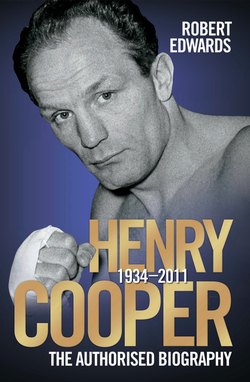Читать книгу Henry Cooper - The Authorised Biography - Robert Edwards - Страница 6
На сайте Литреса книга снята с продажи.
PREFACE TO THE 2012 EDITION
ОглавлениеWhen I heard of the untimely death, three days before his birthday, of one of the finest (and brightest) men I have ever had the good fortune to meet, I was, like many others, deeply moved. People with whom I had had no contact for a long time started to reconnect, simply to discuss how sad they were. It is like this when we lose someone we have learned to believe to be a fixture, a part of the National landscape, a well-remembered face. Images of Jim Clark, Graham Hill, even Diana, Princess of Wales, flashed across my mind. In my view, Henry was of that rank.
For, we do, collectively, feel loss. We feel diminished by their passing. We need them. For most people, frankly, are not very good at what they do.
Henry was. The British sporting public do not need their heroes to be World Champions. Stirling Moss, for example, never was, although many people don’t know that. And those who do, don’t care. It’s very nice when that happens, they reason, but it is not a requirement for hero status. What is needed is the sense that these people give of their best. British champion will do nicely. Empire & Commonwealth will do even better. But most importantly, they need to be the real deal. Henry was.
I hadn’t seen him for a while; the last time had been at the Thomas à Becket, which had previously served as his training headquarters. I had heard of the sudden death of his adored wife Albina and was uncertain (as one always is) as to how to behave. Grief can be a very isolating experience, both for the sufferer of it as well as their circle. And I knew how close they had been.
The occasion was the unveiling of a ‘blue plaque’ in recognition of Henry’s contribution to his sport, the neighbourhood and indeed the wider community. He was expected, and there was a murmur of anticipation. Here was to be present one of the most famous faces in British sport; a gentleman and the man possessed of one of the most terrifying punches in boxing history. You would not volunteer to have been in the path of it.
Many of those present, who were the most eager to meet him were not even boxing fans. In politically correct Southwark, boxing can be disapproved of.
There was a fluid agenda. He’d certainly say something, I might too, time permitting and we’d all have the opportunity for some refreshment and a natter. The place was packed…
I met him outside. He was bang on time (a courteous eight minutes early, in fact, as usual), immaculately turned out, as he always was, his suit a masterpiece, his loafers gleaming. He seemed tired and reduced, though, and his high colour alarmed me. I also knew that he was worried about his twin brother, because someone had taken the trouble to tell me.
I was apprehensive for him – this was one of the first occasions he’d ‘performed’ since his tragic bereavement. Would he be up to it? I’m not sure I would have been in his position.
We shook hands and spent a few moments chatting while I finished my cigarette: He knew he hadn’t the time to light one of his own cigars.
‘How are you?’ I asked. A bovine, stupid question on my part, but he obviously knew why I had asked it. I had dropped him a line (embarrassingly late, because I had not known) about Albina (who I had liked immensely), but with the usual sign-off – ‘H – please don’t trouble yourself in replying to this note…’
‘Oh, I’m all right, Robert. It’s been difficult, but I’ll survive…’
After a little more small talk, I stubbed out my fag and in we went. I introduced him: ‘Ladies and Gentlemen – Henry Cooper…’
One of the biggest rounds of applause I have ever heard probably then lifted the floorboards in what used to be his training room upstairs. Had Jim Wicks’ ratty little office still been there, I’m sure the dust would have risen from the desk; the telephones would have tinkled.
I needn’t have worried, in the event. He was splendid. Funny, relaxed, self-deprecating and ‘accessible’. There was no question he would not answer. There were some long-lost old friends of his there and to hear him chat with them was charming, in the proper sense of that over-used word. Some of them had led very hard lives, it seemed to me.
He stayed several hours – I don’t think there was a single person present to whom he did not speak, and that included Traffic Wardens and PCSOs (trust them to sniff out a free sandwich) who wandered in off the street. It was Open House, which seemed appropriate.
In short, I was proud of him. But this book is not about me; it’s about him, his life and his times. And what times they were…
I have amended this book very little; not because I’m idle, but because I believe that a writer only ever gets (and only should ever get) one shot at the ‘feel’ of a book; the tone of it.
I’ll miss Henry; he was a magnificent man, likeable and straightforward and, after he retired, boxing receded in the national consciousness by a vast margin. Even people who disliked what he did could never bring themselves to dislike him. We are still searching for his replacement. Some have come close, but – I don’t really think so…
R.I.P.
